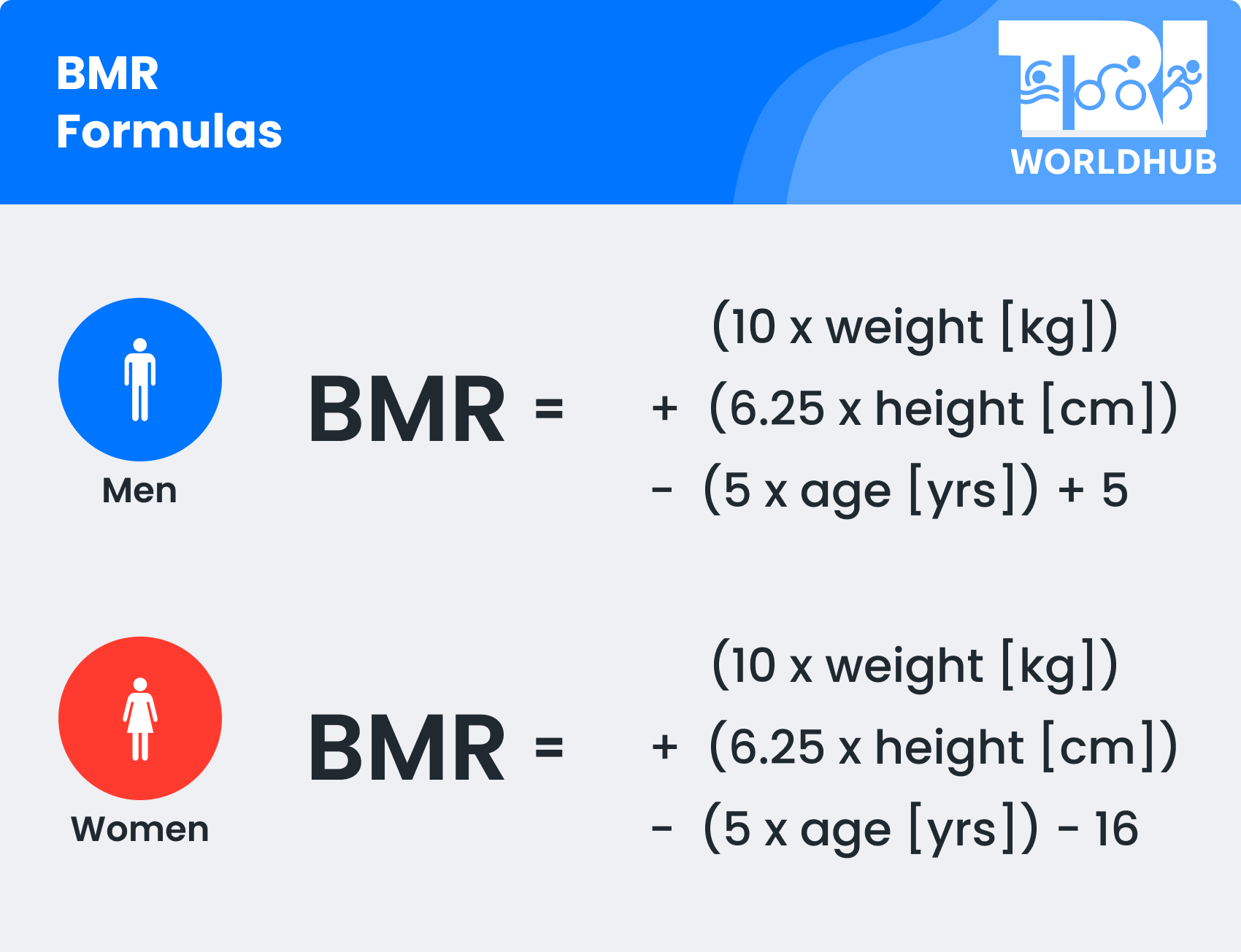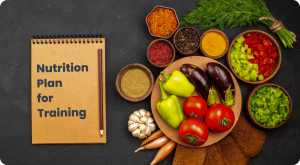A good triathlon nutrition plan plays a crucial role in unlocking your potential and achieving success in triathlon – from fueling grueling training sessions to developing a mid-race energy strategy.
Whether you’re catering to dietary preferences or addressing unique training requirements, this guide will help you take control of your nutrition strategy and reach your full potential in the world of triathlon.
With the right approach to nutrition for triathlon, triathletes can optimize their training and competition performance, pushing their limits and achieving their goals.
Let’s start this journey together by exploring the key elements that contribute to success in the triathlon world.
Building a Strong Triathlon Nutrition Base for Training
A solid nutritional base is crucial for maximizing the effectiveness of your triathlon training.
This foundation is built upon three key pillars: calorie needs, macronutrient balance, and hydration.
1. Calorie Needs
Every athlete has unique calorie needs, influenced by factors like age, weight, activity level, and training volume.
Calculating your daily calorie needs helps ensure you have enough fuel for training, recovery, and daily activities.
Under-fueling can lead to fatigue, decreased performance, and even injuries while over-fueling can hinder progress and contribute to weight gain.
Here are two common methods for estimating your daily calorie needs:
– Harris-Benedict Equation
This equation uses your age, weight, height, and sex to estimate your Basal Metabolic Rate (BMR), the number of calories your body burns at rest.
Multiply your BMR by an activity factor (1.2 for sedentary, 1.375 for lightly active, 1.55 for moderately active, 1.725 for very active, and 1.9 for extremely active) to determine your daily calorie needs.
– Online Calorie Calculators
Several online calculators can help you estimate your calorie needs based on your personal information and training volume.
Be sure to choose a reputable calculator and adjust your intake based on individual responses and progress.

2. Macronutrient balance
Carbohydrates, protein, and fat are the three macronutrients that provide the energy your body needs for training and recovery.
Each plays a vital role:
– Carbohydrates
The primary fuel source for your muscles, especially during high-intensity efforts.
Aim for 5-8 grams of carbohydrates per kilogram of body weight per day.
– Protein
Crucial for muscle repair and building.
Aim for 1.2-1.6 grams of protein per kilogram of body weight per day.
– Fat
Provides long-lasting energy and supports hormone function.
Aim for 20-35% of your daily calories from fat, focusing on healthy sources like nuts, seeds, and avocados.
Individual training needs may require adjustments to these recommendations.
For example, athletes undergoing intense training periods may need to increase their carbohydrate intake, while those focusing on weight loss may need to adjust their overall calorie intake or macronutrient ratios.
3. Hydration
Proper hydration is essential for optimal performance and overall health.
Dehydration can lead to fatigue, decreased cognitive function, and muscle cramps.
Aim to drink plenty of water throughout the day, focusing on increasing intake before, during, and after training sessions.
Here are some guidelines for fluid intake:
– Pre-workout
Drink 16-20 ounces of water 2-3 hours before training.
– During workout
Sip fluids regularly during your workout, aiming for 7-10 ounces every 15-20 minutes.
– Post-workout
Drink 16-20 ounces of water for every pound of weight lost during training.
Monitoring your urine color and consistency can help you assess your hydration status.
Aim for pale yellow urine, indicating proper hydration.

Pre-workout and Post-workout Triathlon Nutrition
Pre-workout and post-workout triathlon training nutrition play a crucial role in optimizing performance and recovery.
1. Pre-workout
Aim to consume a meal or snack 2-3 hours before training.
This meal should be high in carbohydrates and moderate in protein and fat.
Carbohydrates provide the primary fuel for your muscles, while protein helps support muscle repair and building.
Choose easily digestible options like:
– Oatmeal with fruit and nuts
– A bagel with peanut butter and banana
– Yogurt parfait with granola and berries
– Toast with avocado and egg
– Protein smoothie with fruit and spinach
If you train early in the morning, adjust your pre-workout snack accordingly.
Aim for smaller, easily digestible options like a banana or a piece of fruit with nut butter.
Higher-intensity workouts require more readily available fuel, so opt for carbohydrates with a higher glycemic index (GI).

2. Post-workout
Within 30 minutes of finishing your workout, consume a meal or snack that includes carbohydrates and protein to replenish glycogen stores and repair muscle tissue.
The ideal ratio is 3-4 grams of carbohydrates to 1 gram of protein.
This combination helps refuel your muscles and initiate the repair process.
Choose options like:
– Protein smoothie with fruit and spinach
– Grilled chicken with brown rice and vegetables
– Turkey sandwich with whole wheat bread and avocado
– Tuna salad on whole-grain crackers
– Greek yogurt with fruit and granola
Consider consuming a sports drink containing carbohydrates and electrolytes 15-20 minutes before training.
This can provide a quick boost of energy and help maintain hydration.
If you have another training session later in the day, consider having a small, high-carbohydrate snack 1-2 hours after your initial post-workout meal.
This will help ensure optimal glycogen stores for your next training session.
By prioritizing proper calorie intake, balancing macronutrients, and staying hydrated, you can build a strong nutritional foundation for your training, enabling you to push your limits and achieve your triathlon goals.
In the next part, we’ll delve deeper into fueling for race day and explore additional strategies for individualizing your triathlon nutrition plan.

3. Additional Strategies
– Experiment
Practice your race day fueling strategy during training sessions to find what works best for you.
– Listen to your body
Pay attention to your hunger and energy levels during the race and adjust your fuel intake accordingly.
– Don’t try anything new
Stick to foods and beverages you know you tolerate well and avoid experimenting with new products on race day.
Individual Goals During Triathlon Nutrition Plan
No single triathlon sports nutrition plan fits all athletes, as individual needs and goals vary greatly.
Tailoring your strategy is crucial to optimize performance, recovery, and overall health.
Here are some key factors to consider:
– Training volume and intensity
Higher training demands require adjustments in calorie intake and macronutrient balance to ensure proper fuel availability and muscle repair.
– Personal preferences
Choose foods you enjoy and tolerate well to avoid digestive issues and ensure long-term adherence to your triathlon nutrition plan.
– Body composition and metabolic factors
Consider factors like body weight, fat percentage, and metabolic rate when customizing your calorie needs and macronutrient ratios.
– Dietary restrictions
Individuals with specific dietary restrictions, such as allergies or intolerances, need personalized guidance to ensure adequate nutrient intake.
The required calorie intake varies greatly from person to person, so factors such as:
1. Age: Your calorie needs decrease as you age.
2. Sex: Men typically require more calories than women.
3. Activity level: The more active you are, the higher your calorie needs will be.
4. Body size: Your calorie needs are based on your height, weight, and body composition.
5. Current health: Certain health conditions may affect your calorie needs.

Your pre-race breakfast can determine your success. Learn what to eat the morning of a marathon to fuel your journey to the finish line.
Common Triathlon Nutrition Mistakes During Training
Proper triathlon nutrition is crucial for maximizing performance and success in triathlon.
However, even experienced athletes can sometimes fall victim to common nutritional mistakes.
Here are some of the most common pitfalls to avoid:
1. Inadequate Pre-Race Fueling
Many triathletes either skip pre-race meals or fail to build a balanced race week meal plan rich in carbohydrates, proteins, and fats.
Not consuming enough calories to perform your workouts can lead to fatigue, decreased performance, and increased risk of injury.
Make sure your calorie intake meets your training needs and allows for proper recovery.
2. Ignoring Hydration Needs
Dehydration is a significant concern, especially in endurance sports like triathlon.
According to statistics, as much as 50% of athletes experience dehydration during training, impacting their performance and cognitive function.
Some athletes underestimate their fluid requirements or forget to hydrate adequately during training and racing, which can lead to decreased performance, fatigue, and even cramping.
Maintain adequate hydration levels throughout the day, especially before, during, and after exercise
3. Over-reliance on Supplements
While supplements for endurance can be beneficial, relying too heavily on them without focusing on a well-rounded diet might lead to neglecting essential nutrients from whole foods.
Additionally, overuse or improper use of supplements can have adverse effects on health and performance.
4. Overlooking Post-Race Recovery Nutrition
Studies suggest that up to 30% of athletes unknowingly under-fuel, leading to performance limitations and increased injury risk.
So failing to prioritize post-race nutrition can prolong recovery time and hinder muscle repair.
Not replenishing glycogen stores and neglecting adequate hydration after the race can impact subsequent training sessions or future races.
Prioritize to provide your body with the right nutrients at the right time to optimize the benefits of your workouts.
Addressing these prevalent mistakes can significantly improve a triathlete’s performance and overall health.
Tips to Follow to Eat Healthy
1. Calculate your Basal Metabolic Rate (BMR)
This represents the minimum number of calories your body needs at rest.
You can find online calculators or consult a healthcare professional for guidance.
Here, you can learn more about metabolic testing for athletes, what it takes, and why do triathletes need it.
2. Adjust for Activity Level
Multiply your BMR by an activity factor based on your lifestyle (sedentary, lightly active, moderately active, very active, etc.) to estimate your daily calorie needs.
3. Monitor Your Progress
Track your calorie intake and weight changes over time.
Adjust your intake as needed to achieve your desired results.
4. Get Personalized Advice
A survey found that only 30% of triathletes seek professional advice from a registered dietitian or sports nutritionist to develop a personalized nutrition plan.
Therefore, if you want to eat right and avoid harming yourself, consult a registered dietitian or nutritionist for a customized plan based on your specific needs and goals.
Also, nutrition coaching can be a great gift idea for yourself or your fellow triathlete. Check out this selection of the best triathlete gifts for ideas and inspiration.

Conclusion
Fueling your triathlon journey is not simply about consuming calories; it’s about understanding your body’s unique needs and crafting a personalized nutrition for a triathlon training strategy that empowers you to achieve your full potential.
Through careful planning, informed choices, and continuous learning, you can unlock the power of proper nutrition triathlon to propel your performance, accelerate recovery, and conquer the challenges of the triathlon world.
Remember, this is only the beginning.
Embrace the ongoing journey of exploration and experimentation, fueled by a passion for the sport and a commitment to your well-being.
As you navigate the world of triathlon sports nutrition, keep key takeaways in mind. Here is everything you should know about nutrition during the triathlon race.





